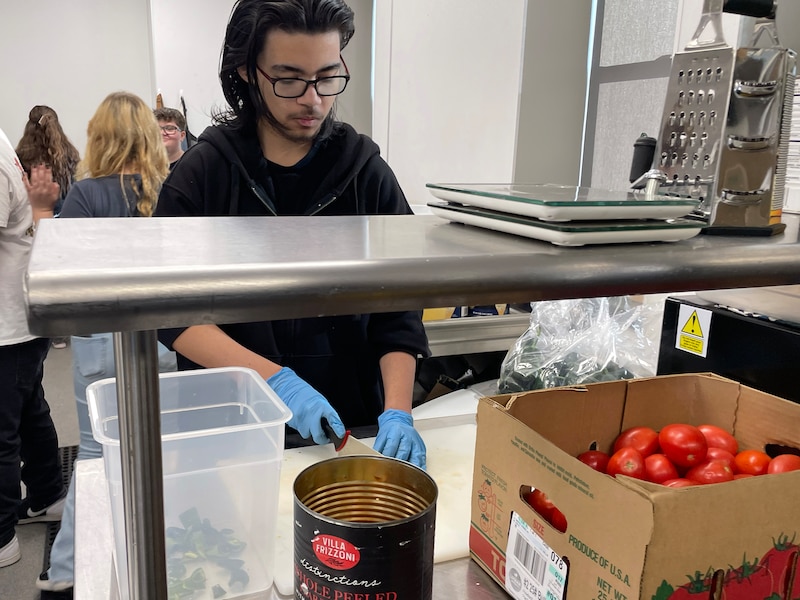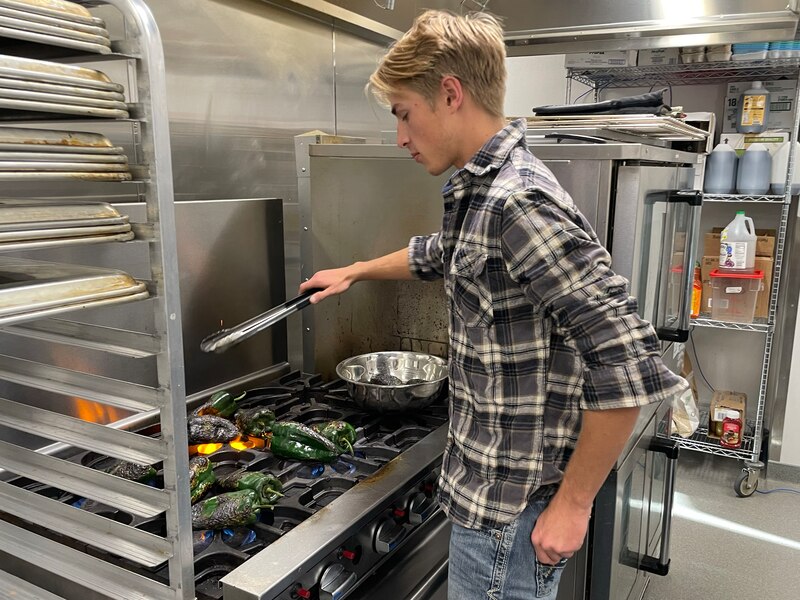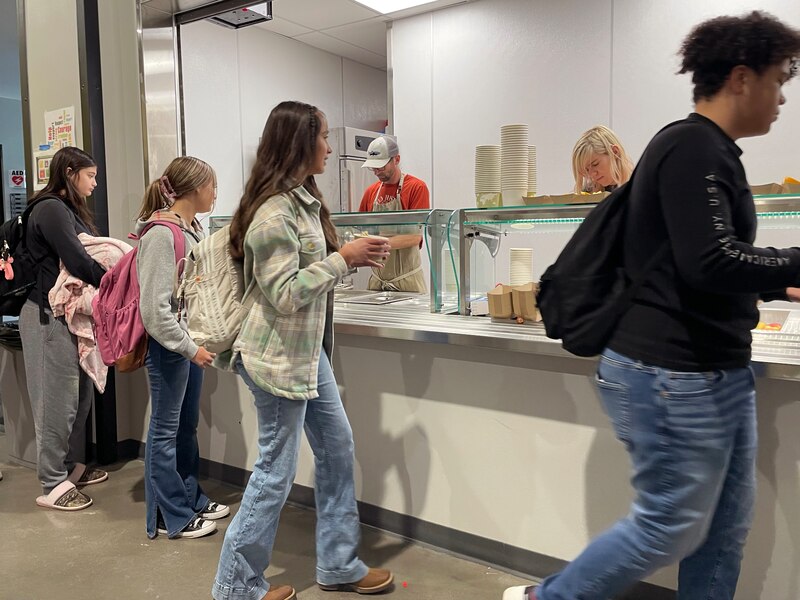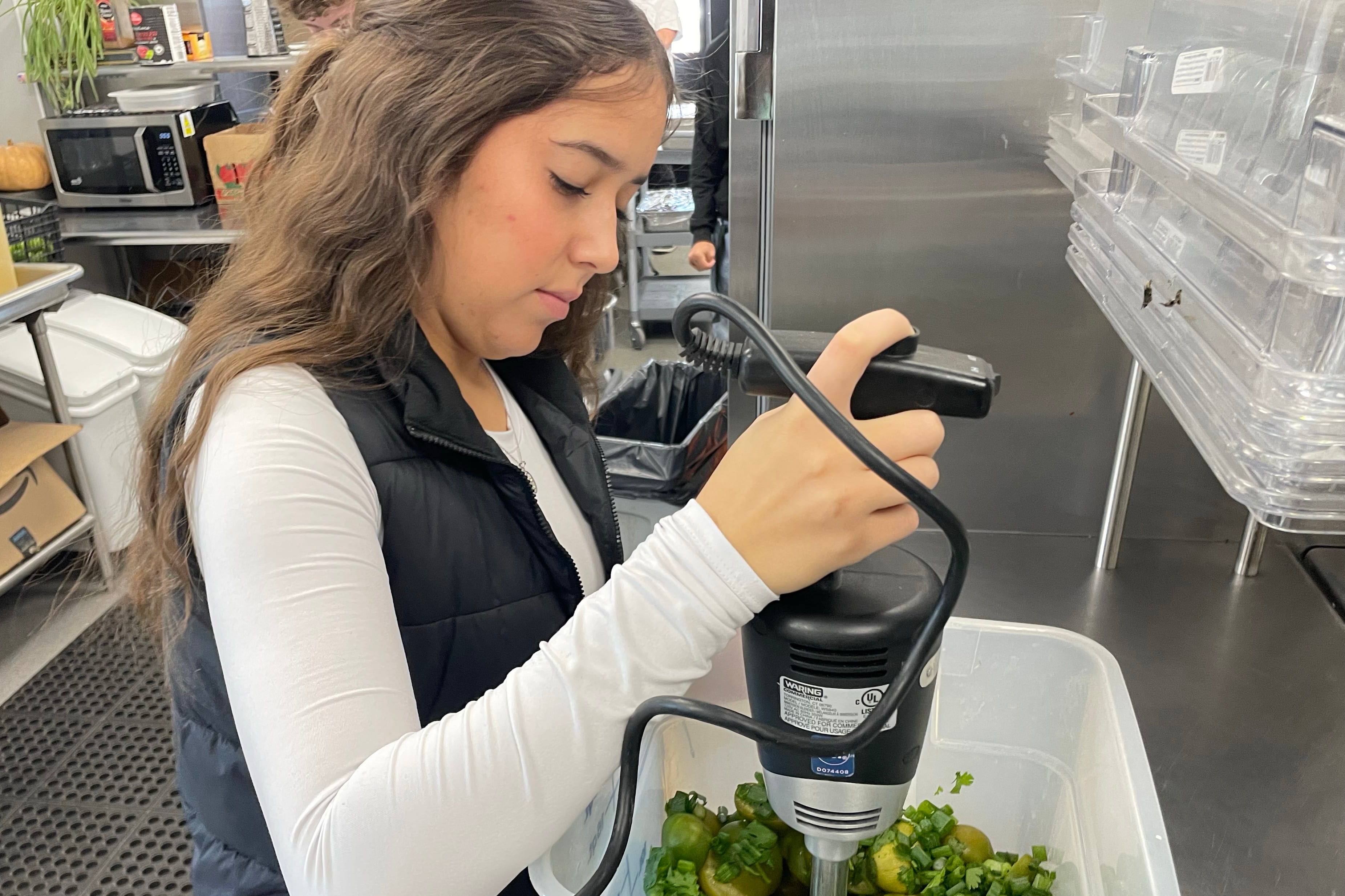Sign up for Chalkbeat Colorado’s free daily newsletter to get the latest reporting from us, plus curated news from other Colorado outlets, delivered to your inbox.
Brayden, Sabrina, and Rachel scraped the charred skins off poblano peppers, squished out the seeds, and dropped the slippery pepper flesh into a stainless steel bowl.
“Guys! Why are we leaving so many seeds in there?” 16-year-old Sabrina said, half laughing, half exasperated.
“Oh my God, they just keep appearing,” said Brayden, also 16. “I clean it off and eight more show up.”
It was almost 9 a.m. on a Tuesday, and the three worked with classmates to make posole in their first class of the day at STEAD School, a charter school in Commerce City northeast of Denver. In just over two hours, the fragrant Mexican soup of hominy, chicken, peppers, and tomatillos would be the star of their high school’s lunch line. Grapes, orange wedges, and a salad bar were the supporting actors.

The morning meal prep session happens four days a week at STEAD, an agriculture and science-focused school where you might hear a rooster crow on your way to the main entrance. Students in two “food crew” classes help prepare scratch-cooked meals for more than 200 students and teachers every day but Wednesday, which is a half day. Under the direction of Dain Holland, the school’s farm and food manager, they make entrees like bison bolognese, sesame orange chicken, cheeseburgers, and Vietnamese bánh mì sandwiches, all of which adhere to federal school nutrition guidelines.
STEAD, which enrolls more than 400 students, isn’t the only school in Colorado with a student-powered lunch program. Compass Montessori, a charter school in Jefferson County where some STEAD staff previously worked, has long had a similar set up.
At STEAD, the lunch initiative came about partly out of necessity. When the school opened in 2021, a neighboring district provided lunches — “kind of your standard reheat-and-serve” fare, Holland said. But after two years, the district decided to discontinue its contract with STEAD.
That’s when Holland, who previously worked as a chef at restaurants like Denver’s upscale Barolo Grill and led a food service program at a California university, decided to launch a student-run lunch operation.
“There’s a ton of kids here that show interest in culinary,” he said. “We have these beautiful, brand new kitchens, so it might as well be used.”
Holland said most students take an introductory culinary class before enrolling in the food crew class, though he makes exceptions if students have cooking experience at home or at a job. Food crew emphasizes food safety precautions, including keeping dishes at the proper temperature and avoiding cross-contamination.
The day of the posole lunch, about a dozen students worked at stations around the kitchen, chopping vegetables for the soup or the school’s salad bar. Hunter, a senior who’s a teaching assistant for the class, charred poblano peppers on a six-burner gas stove and helped prepare raw chicken to be baked. Holland, who wore a brown apron with markers and a pen clipped to the pocket, offered assistance and cooking tips as he circulated.

“Anything you do in a normal commercial kitchen, they’re all doing here,” he said. “It is treated almost like a job, like a shift at a restaurant. I have a big prep list every day.”
Riley, a 17-year-old senior who carefully chopped a yellow onion, said he fell in love with cooking because someone is always in the kitchen at his house, usually his dad or grandma. He’s already been admitted to the culinary arts program at Colorado Mesa University in Grand Junction for next year.
“The dream is to be a personal chef,” he said.
Not every food crew student wants a career in cooking though. Some simply like the relaxed hands-on nature of the class or enjoy cooking as a pastime.
Admire, a junior who often makes soups and chicken dishes with his mother, said he’s considering a career in music or architecture. But he enjoys the food prep class because cooking for the whole school involves a different level of responsibility, he said.

Brayden, a junior who worked with Sabrina and Rachel de-seeding peppers, said cooking is his third-line career option, if professional pool-playing or real estate don’t work out.
Like several other students in the class, he said pizza is a favorite lunch to make. He joked about his class’s superiority on that front.
“In the other class, they make the crust really thin and like, there’s no sauce and stuff, and then us, we make it really thick, cheese, sauce, everything,” he said. “So, we are the preferred class for pizza days.”
Ann Schimke is a senior reporter at Chalkbeat, covering early childhood issues and early literacy. Contact Ann at aschimke@chalkbeat.org.







